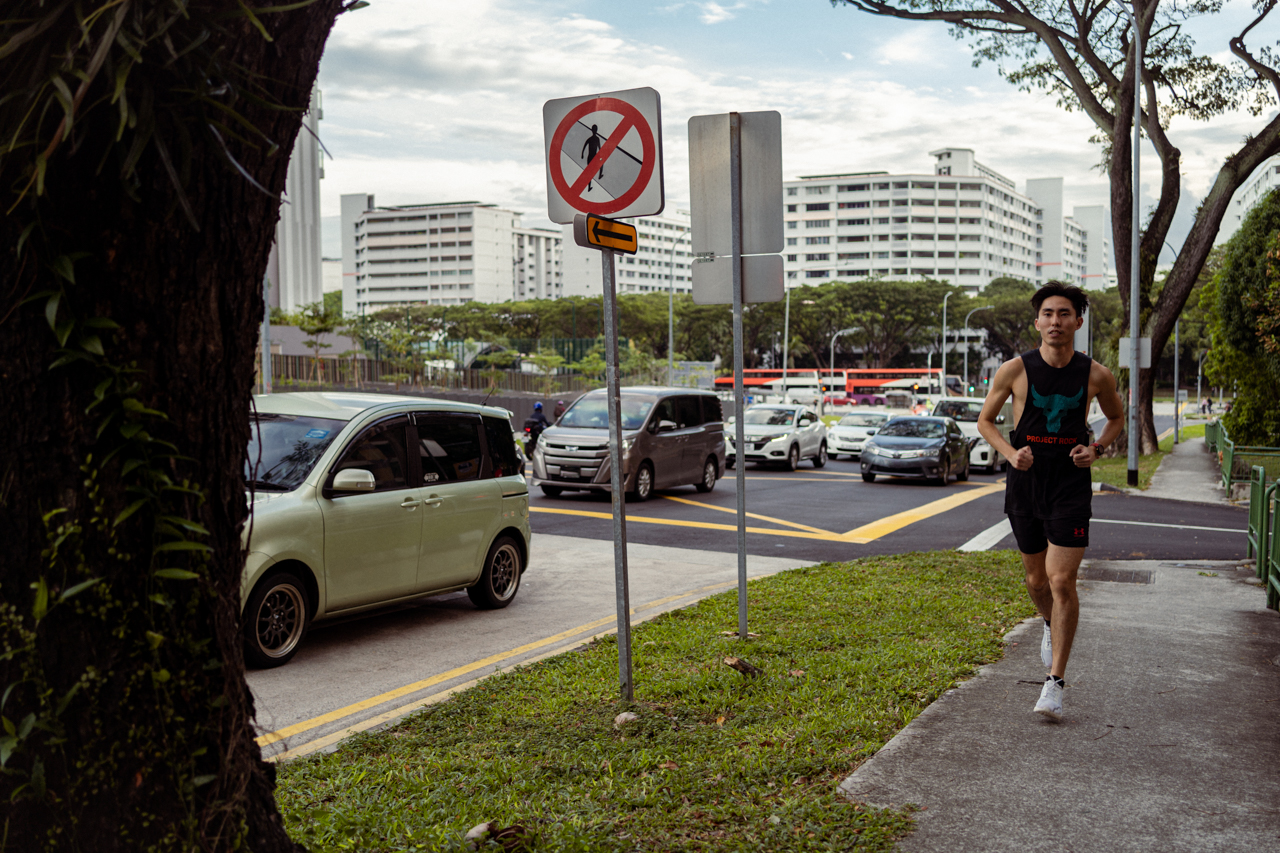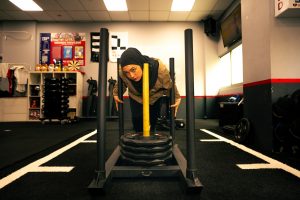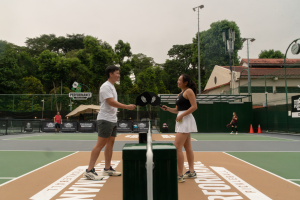All images by Stephanie Lee for RICE Media
When I met national long-distance runner Soh Rui Yong, it was to discuss his 2023 South East Asia (SEA) Games outing. He had just clinched Singapore’s first medal in the men’s 10,000m race and went viral for sharing his water with an Indonesian competitor.
It was the tail end of the race, and Rui Yong was trailing Rikki Simbolon, who’d failed to grab a cup of water. Rui Yong offered half of his water to Rikki, who eventually beat him by about two seconds to win the gold medal.
It’s not Rui Yong’s first act of sportsmanship that’s made headlines. But it wrapped up the runner’s return to SEA Games on a positive note.
He showed up to our lunch in his uniform: running shorts and a tank top with armholes so wide his wiry torso is pretty much visible for all to see. Nip slips abound while we chow down on Thai food.
He’s going for a run after our appointment, of course. There’s a reason he holds four national records: the 5,000m, 10,000m, half marathon, and marathon.
Over green curry, tom yum soup, and three (!) bowls of rice, he shared that he looks forward to competing in the 10,000m and 5,000m races at the upcoming Asian Games in Hangzhou.
With powerhouses including Japan, South Korea, China, Qatar, and Bahrain present, the competition will be fiercer than what he faced at the SEA Games, but the 31-year-old looks psyched.
“It’s really a rare opportunity to race athletes of this calibre. So I’ll be very excited to get in shape and do what I can on that stage.”
His words, unfortunately, didn’t age very well.
Just days after I spoke to him, news broke that the Singapore National Olympic Council (SNOC) decided to exclude him from the Asian Games line-up.
It’s not the first international competition he’s been restricted from. And it might not be the last—at least with the way things are playing out.
‘Controversial Content on Social Media’
Rui Yong was left out of the SEA Games line-up in 2019 and 2021—both for displaying “conduct that falls short” of SNOC’s expectations.
The organisation, which coordinates athlete selection for major sporting games, hasn’t publicly specified instances of his allegedly poor conduct. It’s easy to hazard a guess, though.
Back in 2017, SNOC issued him a warning for promoting personal sponsors such as ASICS on social media during what was supposed to be a sponsor blackout month. Athletes competing in the SEA Games were only allowed to promote SNOC sponsors from August 5th to September 5th, which Soh felt was unfair.
He’d spoken out against this, pointing out that the rule only made it harder for athletes to secure sponsorship from brands and the financial support they need to compete at a high level.
Then there’s that long-drawn spat with fellow runner Ashley Liew. It all started when Ashley received praise for sportsmanship at the 2015 SEA Games.
He’d supposedly slowed down to allow runners who’d missed a U-turn point to catch up. Rui Yong disputed Ashley’s version of events and was subsequently sued by the latter for defamation. The legal dispute spanned 2019 to 2022, and the courts ruled that Rui Yong was to pay Ashley $180,000 in damages.
Soh Rui Yong was ordered to pay S$18,000 in costs for the appeal hearing, in addition to the S$125,000 in costs that he was ordered to pay for the district court trial.
Posted by CNA on Monday, March 28, 2022
It’s 2023, and things are playing out pretty similarly. His Asian Games snub is due to “controversial content on social media”, SNOC explained in a media statement.
“It is unfortunate that notwithstanding efforts made to support and rehabilitate him, the Committee is not satisfied that he has changed for the better to earn selection for the Asian Games.”
Two documents leaked to The Straits Times (36 pages in total) detail social media comments SNOC took issue with. They’d supposedly compiled the comments and sent the list to Singapore Athletics.
Rui Yong responded by removing the posts in question. He was still excluded from the final Asian Games line-up.
The incidents in the documents range from somewhat understandable (such as comments on the Ashley Liew incident) to downright puzzling (joking about a threesome with YouTuber Titus Low).
Any insinuation by Rui Yong that he wasn’t completely at fault in the Ashley Liew incident appeared to ruffle SNOC’s feathers.
For example, SNOC apparently had an issue with a sentiment Rui Yong expressed in a Straits Times article:
“I learned that you can disagree and you can point out wrongdoing, but when you do so, in a way that people lose face or people feel the need to defend themselves, then nobody looks good.”
Musing about sportsmanship doesn’t seem okay if you happen to be Soh Rui Yong. He’d recently reshared an AsiaOne article about his recent viral act of SEA Games sportsmanship with a caption that says:
“True sportsmanship isn’t a constructed narrative or an excuse for not winning, but rather it is verified through actions, as small and instinctive as they might be.”
This was, according to SNOC, a reference to Ashley, and they weren’t a fan.
For some reason, SNOC also found it objectionable that Rui Yong had shared a photo taken with Titus, and responded, “Come bro threesome”, to a friend’s comment asking if this was the start of his OnlyFans career.
Lately, the organisation wasn’t too pleased about Rui Yong dropping the F-bomb several times in a recent episode of local podcast Silverfox Hustle.
Some of SNOC’s concerns are valid. Rui Yong lost the defamation suit brought against him by Ashley, and the subsequent appeal, after all. So continuing to imply that Ashley did do something wrong might not be the best idea.
But should a grown man in his 30s lose a professional opportunity for saying “fuck” or making a joke about a threesome? I’m not so sure. In practically any other industry, having your words under this level of scrutiny by an employer would not be acceptable. Why, then, do athletes like Rui Yong have to be subjected to this?
When I ask Rui Yong about the Asian Games disqualification, he’s understandably indignant: “I found out through the press, same time as everyone else.”
He wasn’t given a chance to clarify his posts in front of the Asian Games appeals committee, he says. The runner still harbours some hope that SNOC will reverse their decision.
“I look forward to proving myself on the track, and I hope the committee would see sense in putting me on the team for the Asian Games. And on my part, I also endeavour to be more careful.”
For what it’s worth, online sentiment appears to be squarely in Rui Yong’s favour. Reacting to the news, one commenter said: “This is why Singapore sports will never improve. When the personal feelings of people at SNOC is more important than what’s best for Singapore.”
Another netizen, claiming to be a former national athlete, wrote: “Sports in Singapore is so ridiculously run. There are good people in there, but it’s few and far between. So many tiny people with inflated egos.”
Worker’s Party’s Yee Jenn Jong spoke up for Rui Yong, saying: “Just let sports people do their work and stop stalking them on social media.”
Just let sports people do their work and stop stalking them on social media. Let him who has no sin cast the first…
Posted by Yee Jenn Jong 余振忠 on Friday, June 9, 2023
Rui Yong appears heartened by the support. On our second meeting, he’s once again preparing to go for a run. As he cycles through his pre-run foam rolling routine, he pulls up a video by blogger Lee Kin Mun (AKA Mrbrown), titled Kim Huat and the Singapore Sports.
Mrbrown never actually mentions Rui Yong by name, but the message of the video is clear: “Even if you’re the best swimmer, runner, or don’t know what of Singapore, you can get cancelled very easily one.”
As Rui Yong rolls out on his yoga mat, he chuckles at Mrbrown’s quips.
His Asian Games exclusion is disappointing for many, Rui Yong included. But all in all, he seems to be in good spirits.
He’s already accomplished his professional goals. Being able to participate in more races would simply be a bonus and not the be-all and end-all of his career.
“I’ve done what I needed to do. I ran in the SEA Games three times and won three medals, two of them gold. That’s more than I would have ever dreamed of as a kid.”
He is confident, however, that he’s got more in the tank. “I definitely would have won a medal in each of the last two SEA Games that I missed. A hundred percent.”
Social Media Shenanigans
Even though he’s hit 30 (and is one of the older racers out there still competing), his athletic prowess isn’t in question.
His impressive SEA Games showing came after just six weeks of preparations, he reveals in between sips of Thai milk tea. He wasn’t even on the original shortlist of athletes and had to go through an appeal panel to secure his spot on the team.
When he got the news, he was having lunch with two Singapore Athletics staff members.
“They said, ‘Oh, you got it!’ and I said, ‘Okay, great! Oh damn, only six weeks to go. I need to start preparing.’”
The man’s still keen on competing and setting records. But it’s not his running ability throwing a wrench in his attempts to join major sporting games.
Rui Yong shows me screenshots of several social media posts that he says he has been asked to take down, most of them along the lines of the ones mentioned in the Straits Times report.
He’s equal parts amused and vexed as he points out a Facebook reaction—a laughing emoji—that he’d been asked to retract. I read the comment—something about real sportsmanship—and it seems innocuous. Perhaps slightly shady at best.
It’s hard to imagine the effort it takes to scrub through everything Rui Yong says. But from the Straits Times report, it seems that nearly everything that the runner says publicly is being watched.
SNOC found 20 issues with the one-and-a-half hour Silverfox Hustle podcast episode, Instagram comments (“come bro threesome”) and references to a Jose Mourinho quote (“I prefer not to speak, if I speak I’m in big trouble”) were flagged in the documents.
At this point, I’m imagining a hapless intern scrolling through Rui Yong’s social media feeds from 9 AM to 5 PM every day, but that’s not the case, according to SNOC.
A SNOC spokesperson tells RICE that the organisation does not actively set out to monitor all social media activity related to its athletes.
“At times, they come to our attention when we are tagged by the athletes or when the content appears on our feed or when the content is shared with us, et cetera.”
Nonetheless, Rui Yong remains as opinionated as ever. Even as he talks about making compromises (such as steering clear of personal insults and deleting posts that upset SNOC) he doesn’t shy away from speaking his mind.
It’s hard to reconcile this version of him with the one who issued two apologies to SNOC last year and admitted that he was perhaps a little harsh in calling them “clowns”.
He doesn’t mince his words about the recent SEA Games.
“I wanted to go back because in my absence, Singapore distance running failed to win any gold medals, and the men’s side failed to win any medals at all. Some don’t like it when I point out the facts, but factually speaking, our performances have been quite dire,” he declares.
“I think the Olympic Council has an issue with me saying that as well, because it sounds like putting people down. But I’m not.”
He explains that not winning a medal doesn’t make an athlete bad, nor is it something to be embarrassed about. It’s simply a sign to train smarter and harder.

It’s worth noting, however, that his disagreements with SNOC aren’t personal. At least, not to him.
“I’ve never had a relationship with them because I have rarely even talked to these people,” he says. “I think if we all had lunch together or something, that might dramatically improve the relationship.”
He’s stuck between a rock and a hard place. Sure, he could simply go dark on social media if he wanted to completely eliminate the risk of getting on SNOC’s bad side. But why should he?
Athletes need to be fiercely competitive to make it to the top of any sport. Is it reasonable to expect the same people to be meek and submissive?
You’d be hard-pressed to find another industry where having a personality and making jokes (within socially acceptable parameters, of course) would cost you professional opportunities.
If my employer ever stalked me on social media to the point of scrutinising my Facebook reactions? I’d be out of there looking for a new job, stat.
For Rui Yong, though, it’s not as simple as putting out feelers on LinkedIn. The man can’t exactly drop everything and run for another country.
He admits that he has considered it. But repping the country he was born and raised in is still the preferred option.
For now, it’s a matter of maintaining a delicate balance between mollifying SNOC and staying true to himself.
The Nail That Sticks Out
It’s not a stretch to say that once he’s done with competitive running—whenever that may be—Rui Yong will be remembered for his straight-talking personality, as much as his achievements on the track.
While the media paints him as defiant and rebellious, he doesn’t exactly agree. Nor does he seem bothered by it. He just speaks his mind freely (or as freely as he can).
“The bar is set so low in Singapore that raising your hand and simply questioning a policy or rule makes you a revolutionary,” he ponders.
In a different country, his behaviour might not even be headlines. In conformist Singapore, the nail that sticks out gets hammered.
In hindsight, he has little regrets about his clashes with SNOC over the years.
“I have nothing to redeem. I didn’t do anything wrong. I stood for what I believed in.”
“If I did anything wrong, maybe it would be the way I went about doing it. Maybe I stepped on toes unnecessarily.”
Step on toes, get axed from representing the country. That seems to be the way things work here. But it begs the question: Is running one’s mouth worse than committing actual crimes?
Silat athlete Sheik Ferdous was allowed to compete in the recent SEA games despite a 2022 DUI. Swimmer Teong Tzen Wei also made the SEA Games team despite his marijuana controversy.
I’m not making a case for these athletes to be kicked off the roster. In Singapore, athletes are put under a microscope, and any misstep (such as Joseph Schooling’s marijuana use) tends to draw flak instead of empathy. The last thing we need is to be even tougher on our athletes.
If some are allowed second chances, though, why is Rui Yong, whose only ‘crime’ is being candid—perhaps a little combative—not allowed to compete for the nation?
In response to RICE’s queries on why some controversy-ridden athletes are allowed to compete and others aren’t, SNOC’s spokesperson says that selection for major games is guided by the requirements set out in the selection criteria.
In addition to this, athletes will have to fulfil their respective National Sports Association’s selection and qualifying standards. Nominations are submitted by the NSAs to the SNOC for consideration. The SNOC also has to comply with the Olympic Charter.
The issue, however, is that the criteria aren’t the most specific. For example, the Asian Games selection criteria mention “general conduct and character” and “attitude and behaviour”.
What defines good conduct and behaviour? Athletes might not know until confronted with all the rules they’ve broken.
Are Our Standards for Our Athletes Reasonable?
Maybe we’re all suckers for a good underdog story. Or maybe we respect people who push the boundaries of human limits. Whatever the reason, sports stars are often a source of inspiration to many.
Time’s top 100 influential figures of 2023 list include athletes Lionel Messi, Patrick Mahomes II, and Mikaela Shiffrin. Some 20 years since his retirement, basketball great Michael Jordan’s sneakers are being sold for millions. The man still has diehard fans.
It’s not strange to idolise an athlete. But should we expect athletes to be our role models? And how perfect do we need them to be? Saying “fuck” in a podcast, as Rui Yong did, hardly makes someone a bad person, even if that person is tasked with flying the national flag.
Any public figure with a platform should use it responsibly—that goes without saying. Some of our standards for our athletes, though, seem to be a bit of an overkill. Training to compete at a high level is hard enough without having to be some paragon of virtue. Maybe it’s time to cut our athletes some slack and let them be humans instead of saints.
When I part ways with Rui Yong at his HDB block, the man is back in his uniform and ready to embark on a casual 11km run to Bedok Reservoir and back.
He still doesn’t know if SNOC will reverse its decision and let him participate in the Asian Games, but he’s not moping around.
All he can do is keep running.






